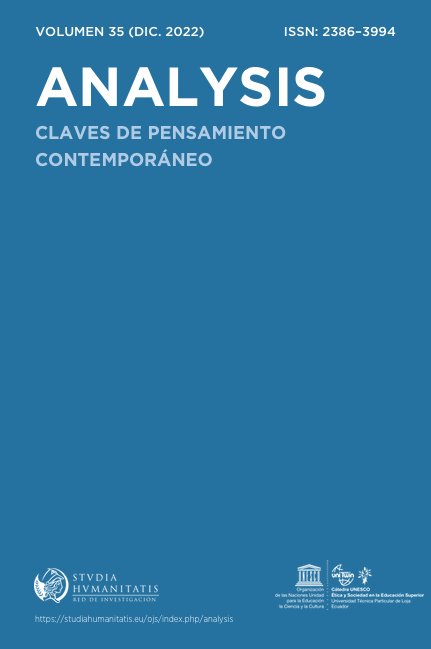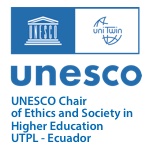Post-truth: the context of misinformation in pandemic times
Abstract
Misinformation has spread as a particularly worrying problem during the pandemic. What does it consist of and what is its origin? It will be shown here that the loss of the social validity of truth and the change of social rationality are key elements to understanding post-truth as a context of misinformation. Such relationships allow us to understand post-truth as a phenomenon still present that requires a response. And the answer, insofar as the idea of truth is at stake, will have to come from philosophy. The problem that remain open pose a challenge for our present.
Downloads
References
Ferraris, Maurizio. (2019). Posverità et altri enigmi. Bologna: Il Mulino. [Trad. cast.: Posverdad y otros enigmas. Trad. de Carlos Caranci Sáez. Madrid: Alianza, 2019].
Gadamer, H.G. (1960). Warheit und Methode. Tübingen: J. C. B. Mohr (Paul Siebeck). [Trad. cast.: Verdad y método. Trad. de Ana Agud Aparicio y Rafael de Agapito. Madrid: Ediciones Sígueme, 2017].
Higgins, Kathleen. (2016). «Post-truth: A guide for the perplexed». Nature 540 (7631): 9. https://doi.org/10.1038/540009a.
Ibáñez Fanés, Jordi (coord.). (2017). En la era de la posverdad. Barcelona: Calambur.
Levitin, Daniel. (2017). Weaponized Lies: How to Think Critically in the Post-Truth Era. New York: Dutton. [Trad. cast.: La mentira como arma. Trad. de Jesús Martín Cordero. Madrid: Alianza, 2019].
Lewandowsky, Stephan, Ullrich K. H. Ecker, y John Cook. (2017). «Beyond Misinformation: Understanding and Coping with the “Post-Truth” Era». Journal of applied research in memory and cognition 6 (4): 353-69. https://doi.org/10.1016/j.jarmac.2017.07.008.
Linares-Peralta, Raúl. (2021). «Dimensión filosófica de la posverdad». Universidad de Granada (Trabajo Fin de Máster). 10.30827/Digibug.72129.
López Veneroni, Felipe. (2021). «De la pandemia a la infodemia: el virus de la infoxicación». Revista Mexicana de Ciencias Políticas y Sociales 242: 293-312. https://doi.org/10.22201/fcpys.2448492xe.2021.242.79330.
Magallón Rosa, Raúl. (2020). Desinformación y pandemia. La nueva realidad. Madrid: Pirámide.
Magallón Rosa, Raúl, y José Manuel Sánchez Duarte. (2020). «Infodemia y COVID-19. Evolución y viralización de informaciones falsas en España». Revista española de comunicación en salud Suplemento 1: S31-41. https://doi.org/10.20318/recs.2020.5417.
McIntyre, Lee. (2018). Post-Truth. Michigan: MIT Press [Trad. cast.: Posverdad. Trad. de Lucas Álvarez Canga. Madrid: Cátedra, 2018].
Nicolás, Juan Antonio. (2009). «La doble vertiente noológico-real del criticismo zubiriano». Cuadernos Salmantinos de Filosofía 36 (Journal Article): 233-48. https://doi.org/10.36576/summa.29071.
Nicolás, Juan Antonio. (2019). «Posverdad: cartografía de un fenómeno complejo». Diálogo filosófico 35 (105): 302-40.
Nicolás, Juan Antonio. (2020). «Apel en época de posverdad». Disputatio (Madrid, Spain) 9 (12). https://doi.org/10.5281/zenodo.3971191.
Sismondo, Sergio. (2017). «Post-truth?» Social Studies of Science 47 (1): 3-6. https://doi.org/10.1177/0306312717692076.
Valdés, Luis M. (2018). «Introducción». En Posverdad, de Lee McIntyre, 13-28. Madrid: Cátedra.
Vattimo, Gianni. (1985). La fine della modernità. Milano: Garzanti [Trad. cast.: El fin de la modernidad. Trad. de Alberto L. Bixio. Barcelona: Gedisa, 1986].
Vattimo, Gianni. (2009). Addio alla verità. Roma: Meltemi. [Trad. cast.: Adiós a la verdad. Trad. de María Teresa D'Meza. Barcelona: Gedisa, 2010].
Zubiri, Xavier. (1980). Inteligencia sentiente. Madrid: Alianza Editorial.
Zubiri, Xavier.. (2015). El hombre y la verdad. Madrid: Alianza Editorial.
Copyright (c) 2022 © Analysis

This work is licensed under a Creative Commons Attribution-NonCommercial-NoDerivatives 4.0 International License.








